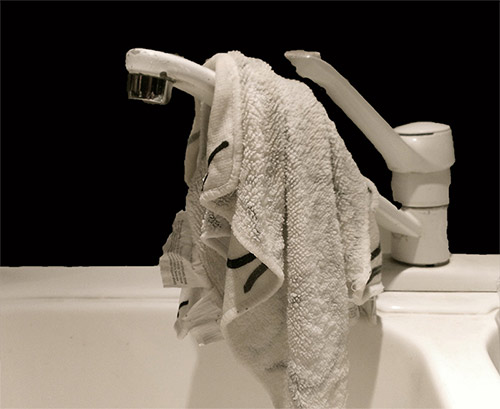The dirtiest thing in your house.
The most germ-infested items in any home are the towels in a kitchen or bathroom.
There seems to be one too many stories in the news about Ebola, some new type of flu and other fast-spreading germs, viruses and bacteria. That has left many people highly focused on staying germ-free. People are quick to clean their door handles, light switches, toilet seats and kitchen sinks. But those are not always the dirtiest things inside a home.

The Kimberly-Clark Corporation commissioned a study that found 89% of kitchen dish towels carried coli-form bacteria, which is found in both animal and human digestive tracts. That means 25% the towels had E. coli. That is enough to turn anyone’s stomach!
The author of this study was Charles Gerba, a professor in the Department of Soil, Water and Environmental Science, at the University of Arizona. Gerba found that towels are more likely to become laden with bacteria than any other item in a home. The reason is rather simple. People wipe their hands on these towels, which are often used to clean countertops. Remember that raw meat often sits on many of those countertops.
Most towels also air dry on a sink or towel rack. The drying process usually takes hours and during that time, bacteria begins to grow.
The cross contamination of food is another common occurrence. Think about how many times you wipe your mouth and then touch something else. Or how about each time your hands touch your mouth? In those instances, you are spreading germs while also infecting yourself. When it comes to face and bath towels, you can spread bacteria and viruses to anyone who makes contact with that same towel.
Are you grossed out yet? Well, don’t worry. You can easily prevent germs from spreading in if you just follow these simple steps.
- Replace or wash your towels every three or four days.
- Always use paper towels to clean the areas where food is prepared, and also use paper towels to wipe your hands.
- Use baking soda and vinegar in place of fabric softener when washing your towels. This will strip away odors and keep the towels absorbent.
- Fabric softeners and dryer sheets are both silicone-based products, which coat the cotton fiber. This results in reduced absorbency in the towels.
- If you don’t want to wash towels every few days, try dipping your kitchen towels in a diluted bleach solution (two teaspoons of bleach per gallon of sink water). Then, simply set them out to dry.
- Drop your yellow sponges (with the green scrubby surface) in the dishwasher every time you run it.
- Fill a spray bottle with water and bleach solution and keep it underneath your sink. This mixture will sanitize your sink, counter-top and dishrag. This helps after you have prepared chicken, turkey or other raw meats.
- Keep in mind that bleach will corrode the spray bottle’s pump mechanism over time. A simple fix would be to repurpose an empty Windex bottle.
- Try to keep a spray bottle of that bleach and water solution in each bathroom. A few spritzes will eliminate any mold that appears in your tub or shower.
 Vero Linens offers Christy towels, which are a benchmark luxury bath towels.to go along with luxury linens for your bedroom. Our luxury bed linens have no retail markup so our prices are always lower than the competition for like quality. When you are ready to buy fine bed linens, snow white down or down and feather sleeping pillows, be sure to check out Vero Linens.
Vero Linens offers Christy towels, which are a benchmark luxury bath towels.to go along with luxury linens for your bedroom. Our luxury bed linens have no retail markup so our prices are always lower than the competition for like quality. When you are ready to buy fine bed linens, snow white down or down and feather sleeping pillows, be sure to check out Vero Linens.
You may also enjoy the following articles:

